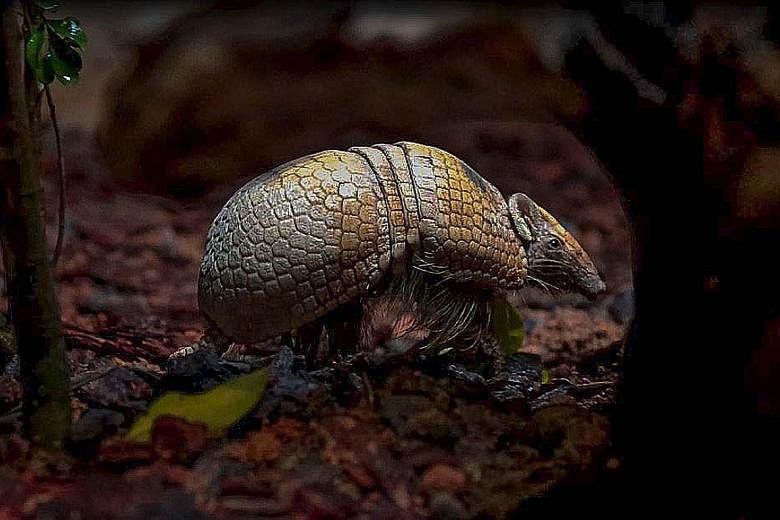The Night Safari has added an "oddball" as a new animal resident - the southern three-banded armadillo. Soon, the male armadillo will be joined by a female.
The Wildlife Reserves Singapore (WRS), which manages the Night Safari, said last Saturday that the armadillo, which is native to central South America, is on show for the first time at the Fishing Cat Trail.
The armadillo is classified as "near threatened" on the International Union for Conservation of Nature Red List, a step away from "vulnerable" on the same list.
It is covered with scales made of keratin that protects it from predators. The mammal has been dubbed an "oddball" at the Night Safari as it can encase itself in its shell, curling its head and back feet and turning into a hard ball.
The male armadillo, named Rocha, arrived from France's Beauval zoo in May this year. It has since "settled comfortably" into its new habitat, WRS said.
Rocha was first conditioned to the exhibit on Oct 16, and officially put on display on Oct 21, WRS director of zoology Luis Carlos Neves told The Straits Times yesterday.
The armadillo will soon get a mate, a two-year-old female from Poland's Wroclaw Zoo that arrived late last month.
The female armadillo is currently in quarantine until Nov 25, and will join the Fishing Cat Trail soon.
Dr Neves said WRS is hoping that the armadillos will breed.
"We intend to give them visual access to each other for a start, and see how they respond to each other, before gradually introducing them," he said.
Staff will monitor the pair's behaviour closely.
"We will also allow the couple plenty of hiding places and spaces to retreat to in the event that one needs to get away from any unwanted attention from the other."
Armadillos of this species reach sexual maturity when they are about nine to 12 months old.
Dr Neves said there were only three births recorded for the species in the past year at the seven zoos in Asia that house it.
As for the 11/2-year-old Rocha, it can be seen frequently exploring, burrowing and digging around, WRS said in its statement.
Rocha's favourite food includes ant eggs and mealworms, but it also eats a selection of vegetables, boiled eggs, apples and insectivore pellets.
Rocha will make appearances at selected Keeper Talk sessions at the Night Safari's Explorer Outpost.
These sessions started last Friday and serve as an interaction hub along the Fishing Cat Trail, where visitors can meet different animals, such as the Sunda pangolin, binturong, serval and other nocturnal animals, on Friday and Saturday nights.
Keepers will speak about the animals' unique characteristics and other traits at these sessions.




